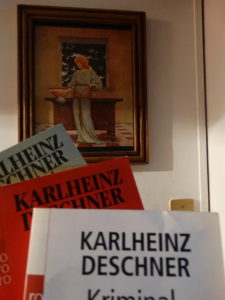 EDITOR’S FOREWORD
EDITOR’S FOREWORD
[pages 5-8 of the forthcoming Edition]
In his after-dinner conversations Hitler said: ‘Christianity is the greatest regression humanity has ever experienced: The Jew has thrown back humanity one and a half thousand years’. And the Romanian philosopher Emil Cioran, who once described himself as a Hitlerist, wrote: ‘The whole world has forgiven Christianity.’
Well, not the whole world. As I confess in my philosophical autobiography De Jesús a Hitler, Christianity played a central role in the destruction of my teenage life and my twenties, something I will never forgive…
Some clarifications
Aleksandr Solzhenitsyn, who was a Christian, wisely allowed Edward Ericson to abbreviate The Gulag Archipelago so that the heavy volumes of the original work could reach a wider audience in a single, readable tome. The present book, Christianity’s Criminal History: Volume I is an abridged translation of the first volumes of Karlheinz Deschner’s Kriminalgeschichte des Christentums. The original German volumes, and also the Spanish translation I have used, contain thousands of endnotes, which are omitted here. This preliminary translation is only the first step towards a more formal German-English translation of Deschner’s maximum opus.
In this abridged translation I have added a few headings, as well as several illustrations with footnotes explaining them, and brackets translating German or Latin terms. Unlike Ericson’s abridgement of the Archipelago, sometimes I have omitted ellipses between unquoted paragraphs, and I have simplified some sentences. I have also replaced some words. I refer to the phrases where the author uses the word ‘pagan’. I replaced it with terms such as ‘Hellenes,’ ‘defenders of Greco-Roman culture,’ ‘classical culture’ or simply added inverted commas on the word ‘pagan.’
The term I have chosen, Hellenes, requires some clarification. It could not be more significant that before the introduction of the pejorative term pagan to refer to unconverted citizens of the Roman Empire, whites were called héllenes or éthne by 4th-century treatises (the expression hellénon éthne can be translated into modern English as ‘the Greek races,’ i.e. the white peoples). As I am aware of the rhetorical use of language, instead of the author’s pejorative term ‘pagan’ I have sometimes chosen the non-pejorative term common in the 4th century vernacular, ‘Hellenes.’
White nationalists claim to be quite informed on the Jewish question. But very few are aware that Jewish subversion began with Christianity, as Hitler said in the opening lines of this preface. Who among today’s nationalists knows the true history of the religion of their parents? Who is aware that Christian fanatics used violence to destroy the ‘pagan’ (i.e., the Greco-Roman world)? Yes: Deschner wrote in German. But how many English-speaking racialists are familiar with Catherine Nixey’s The Darkening Age: The Christian Destruction of the Classical World, published in 2017?
Independently of the nationalists and the racial right, virtually all Westerners ignore the apocalyptic catastrophe of early Christianity after Constantine handed over the Roman Empire to his bishops. They know only the myths of the martyrs (see the chapter ‘The Persecution of the Christians’ in this book), the pious legends, hagiographies and the New Testament fictional tales we were told as children: topics covered in the first section of this abridged translation.
Karlheinz Deschner (1924-2014) was a liberal German. He spent the first sixty years of his life researching the history of the Catholic Church before beginning the ten volumes of his Kriminalgeschichte series in 1986, which he completed in 2013. The series is an encyclopaedic treatise on the true history of Christianity.
I started reading Deschner at the beginning of this century, when I was a liberal, and I would not wake up to the Jewish question until 2010. But Deschner, like all Germans of our time who aspire to see his books in bookshops, never woke up. In his Kriminalgeschichte he went so far as to harshly criticise the anti-Semites of the Early Church: passages omitted in this abridgement. This said, the difference between Deschner and liberal theologians like Hans Küng (The Church) and conservative historians like Paul Johnson (A History of Christianity) is that Küng and Johnson concealed a great deal of the criminal history of Christianity. It is remarkable how Deschner, a scholar who like me became an apostate, was able to see Church history in a way that Küng, Johnson and a veritable galaxy of other Christian scholars would never dream of. After waking up to the reality of the Christian problem I realised that Deschner’s massive work, despite his liberal bias, could be rescued. It just has to be processed through the prism of someone who is racially awake. Of course: if Germany had won the war, Deschner, shown here in National Socialist uniform as a young man, could have written his story from our point of view.
More than one holocaust with millions of victims each has been perpetrated against the Germanic peoples. After 1945, the Allies killed millions of defenceless Germans (see, for example, Thomas Goodrich’s Hellstorm: The Death of Nazi Germany: 1944-1947). This is the best-kept secret of modern history. Conversely, the genocide committed in Germany during the Thirty Years’ War by fanatic Catholics is fairly well known (in the next volume of our abridgement we will incorporate those chapters). But who knows about the millions of other Germanic peoples killed by Emperor Justinian, recounted in this volume?
If the Aryan Man is currently committing ethnosuicide, it is because the System has lied to him about his own History.[1] The System’s favourite method is what we might call lying by omission: not saying, for example, a word about what happened to the Germans in 1945-1947, or how Christianity was imposed on the white race by Constantine and his successors. It was not enough for the Imperial Church to destroy the Greco-Roman world in the 4th and 5th centuries. In the 6th century, after the fall of Rome, Justinian, the Emperor of Constantinople went on to commit a gigantic genocide of the Germanic race, which by then had established itself on the Italian peninsula. Deschner’s chapter on this Holocaust appears in his second volume, Die Spätantike (Late Antiquity), published in 1989. The full title in translation is: ‘Late Antiquity. From the Catholic “child emperors” to the extermination of the Arian Vandals and Ostrogoths under Justinian I (527-565).’ These were the two Germanic peoples that were exterminated during the Byzantine Empire’s military incursion into Italy and Africa (no wonder there are few pure Germanic peoples in those regions today).
Finally, Deschner died in the same year that Richard Carrier published a book which will be considered the most important book since Hermann Samuel Reimarus’ critical approach to the Gospels. I refer to Carrier’s On the Historicity of Jesus: Why We Might Have Reason for Doubt. Deschner did not have the opportunity to evaluate the Christ myth theory in its phase of full exegetical maturity. For a new history of Christianity to be complete, Deschner’s criminal history must be complemented by Carrier’s ongoing work, and even our axiological critique of Christianity (see our booklist on page 3).
César Tort
November 2022
____________
[1] See ‘Foundation Myth’ on pages 90-93 of On Exterminationism.

One reply on “Kriminalgeschichte 2022!”
Prussian American wrote an article in his blog that might be interesting to read:
link
According to him, it seems that the Red Giant effect has started to materialize sooner than I expected.